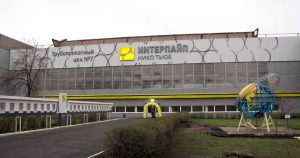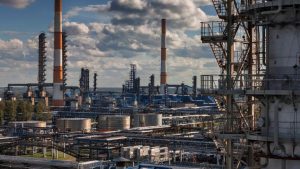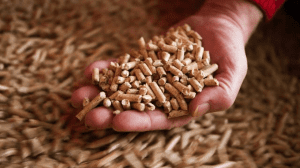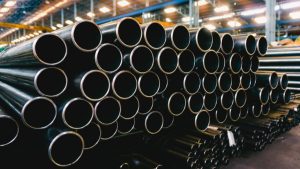
The international vertically integrated pipe and wheel company Interpipe in 2020 reduced steel output by 11.2% compared to the previous year, to 758,700 tonnes.
According the company’s monthly report, the production of pipes in 2020 decreased by 20.9%, to 464,000 tonnes and the production of railway products, by 8.3%, to 190,600 tonnes.
In December, steel output amounted to 61,800 tonnes, output of railway products to 16,500 tonnes, and pipes to 38,400 tonnes.
It is also reported that in 2020 pipes were sold in Europe (29%), the MENA (Middle East and North Africa) region (24%), Ukraine (22%), the CIS (11%), the American continent (11%) and other regions (3%). In December, pipes were sold in Europe (21%), Ukraine (28%), the MENA region (20%), the CIS (9%), the American continent (18%) and other regions (4%).
Railway products last year were sold in the CIS (43%), Europe (35%), Ukraine (14%), the MENA region (4%), the American continent (3%) and other regions (1%). In December, railway products were sold in the CIS (46%), Europe (27%), Ukraine (16%), the MENA region (5%), the American continent (5%) and in other regions (1%).
According to Interpipe’s commentary, sales of most of the company’s products rose in December amid a recovery in the global economy and markets, despite stricter lockdowns in some countries.
Total pipe sales in December 2020 grew 37.2% compared to November 2020, surpassing pre-coronavirus (COVID-19) monthly sales in the fourth quarter of 2019 and the first quarter of 2020. However, year-over-year sales for the 12 months of 2020 were still lower, less by 21% compared to 2019.
Oil country tubular goods (OCTG) sales, after a 142.4% rise in November versus October, grew by 29.8% compared to November amid intensive drilling activity worldwide and optimistic expectations for COVID-19 vaccines and exceeding the threshold of $50 per barrel of crude oil for the first time since March 2020.
Sales of general purpose pipes in December increased by 8.1% versus November due to sales growth in Turkey, the United States and Belarus, while sales of welded pipes fell by 34.1% compared to November in all regions due to unfavorable market conditions.
At the same time, sales of railway products in general over the past year decreased by 5.4%. At the same time, it is noted that the total sales of wheelsets in 2020 increased significantly by 32%.
Interpipe is a Ukrainian industrial company, a manufacturer of seamless pipes and railway wheels. The company’s products are supplied to more than 80 countries around the world through a network of sales offices located in the key markets of the CIS, the Middle East, North America and Europe.

JKX Oil & Gas with assets in Ukraine and Russia in 2020 reduced average daily production of hydrocarbons by 5% compared to 2019, to 10,238 barrels of oil equivalent per day (boepd), the company said on the website of the London Stock Exchange.
Production in Ukraine decreased by 13%, to 4,849 boepd, in particular gas production fell by 15%, to 653,000 cubic meters per day (Mcmd), while oil and condensate by 5%, to 1,007 boepd.
Production of hydrocarbons in Russia increased by 4% and amounted to 5,389 boepd, in particular gas production to 905,000 cubic meters per day, condensate to 61 boepd.
JKX points out that in the fourth quarter of last year, compared to the previous quarter, production decreased by 4%, to 9,825 boepd due to a drop in production in Ukraine by 8%, to 4,351 boepd. In particular, gas production in Ukraine fell by 7%, to 592,000 cubic meters per day, oil and condensate by 10%, to 965 boepd.
JKX notes that the reduction in production is associated with a significant reduction in drilling and workover, but indicates that two new wells were drilled in Ukraine in the fourth quarter – IG146 on Ihnativske field with a current flow rate of 6 million cubic meters per day and 35 boepd and the side part of NN75 on Novo-Mykolaivske field with a current flow rate of 80 boepd.

British-based Ferrexpo Plc, which in Ukraine, in particular, controls Poltava and Yeristovo ore mining and processing plants (Poltava GOK and Yeristovo GOK), in January-November of this year, according to recent data, increased the total production of pellets by 5% compared to the same the period of 2019, to 10.16 million tonnes.
A representative of the company informed Interfax-Ukraine that during this period the output of concentrate increased by 4.8%, to 12.7 million tonnes.
In November, the company produced 980,000 tonnes of pellets and 1.2 million tonnes of concentrate.
According to the company, Ferrexpo in the first quarter of 2020 compared to the same period in 2019 increased its total pellet production by 7.4%, to 2.725 million tonnes. In particular, the production of pellets with a 65% iron content was 2.652 million tonnes (an increase of 9.1%), with a 62% iron content some 73,330 tonnes (a decrease of 31.8%).
In the second quarter of this year, Ferrexpo increased its pellet production by 5.4% from the previous quarter, to 2.873 million tonnes, in particular it produced 2.848 million tonnes of pellets with a 65% iron content (an increase of 7.4%), 24,700 tonnes with a 62% iron content (a decrease of 66.3%).
In the third quarter of 2020, total pellet production decreased by 12% compared to the second quarter, to 2.537 million tonnes from 2.873 million tonnes, while no pellets with a 62% iron were produced.
Ferrexpo is an iron ore company with assets in Ukraine.
Ferrexpo owns 100% of shares in Poltava GOK, 100% in Yeristovo GOK and 99.9% in Belanovo GOK.

The biopharmaceutical company Biopharma (Kyiv) is limited in possibilities of increasing production of the Bioven medication (immunoglobulin) due to the lack of plasma donation culture in Ukraine and the lack of plasma, Oksana Plotnikova, director of strategic development at Biopharma, has said.
“We would like to expect an increase in Bioven production, which is why we are creating plasma centers to increase donor activity among the population. We have many blood donors, but the country does not have a culture of plasma donation for fractionation,” she said at a press conference on the completion of clinical trials of the Bioven drug in the complex therapy of patients with coronavirus disease (COVID-19) on Wednesday.
Plotnikova said that as the world completes clinical trials confirming the effectiveness of drugs based on blood plasma in treatment of COVID-19, the demand for such drugs, and, therefore, plasma will grow.
“We are on the verge of the fact that many countries – Canada, Europe – will restrict imports. There will be no imported drug in the country,” she said.
Plotnikova reported that “Ukrainian donors today do not donate the amount of plasma that could meet the needs of Ukraine.”
“Today, in order to provide Ukraine, we buy plasma from the United States, Slovakia. We cannot buy Indian or Vietnamese plasma, because we do not buy plasma that is not standardized under European standards,” she said.
Plotnikova said that Biopharma actively cooperates with communal blood centers, “so that communal stations develop, reconstruct and procure not only blood components for hospitals, but also plasma for fractionators to provide Ukraine with drugs.”
“The demand for intravenous infusion of immunoglobulin G, and subsequently convalescent plasma and hyperimmune immunoglobulin, is obvious. Today we see and understand that the real effectiveness of the drug makes it possible to save lives, which means that the need is growing,” she said.

Electric steelmaking complex Interpipe Steel of the international vertically integrated pipe and wheel company Interpipe (Dnipro) in January-October of this year reduced steel production, according to operational data, by 13.9% compared to the same period last year, up to 641,000 tonnes.
As the Interfax-Ukraine agency was informed in the company, 62,800 tonnes of steel were produced in October.
As reported, Interpipe in 2019 reduced steel production by 4.2% compared to the previous year to 854,500 tonnes.
Interpipe is a Ukrainian industrial company, a manufacturer of seamless pipes and railway wheels. The company’s products are supplied to more than 80 countries around the world through a network of sales offices located in the key markets of the CIS, the Middle East, North America and Europe. In 2019, Interpipe sold 823,000 tonnes of finished products, including 202,000 tonnes of railway products. Railway products are sold under the KLW brand.
Interpipe employs 11,000 people. In 2019, the company transferred UAH 3.25 billion to the budgets of all levels.
The company includes five industrial assets: Interpipe Nyzhniodniprovsky Pipe Rolling Plant, Interpipe Novomoskovsk Pipe Plant, LLC Interpipe Niko-Tube, Dnipropetrovsk Vtormet and Dniprostal Steel Complex under the Interpipe Steel brand.

The main pipe enterprises of Ukraine in January-October of this year reduced the production of pipes from ferrous metals, according to recent data, by 19.1% compared to the same period last year, to 704,000 tonnes, including 81,600 tonnes produced in October.
As the Interfax-Ukraine agency was informed in the Ukrtruboprom association, in particular, the enterprises of the association in the ten months of the year reduced the production of pipes by 28%, to 449,900 tonnes, including 48,200 tonnes produced in October.
At the same time, according to preliminary data, pipe production at Interpipe Nyzhniodniprovsky Pipe Rolling Plant for the specified period fell by 37.2%, to 120,300 tonnes (in October 14,200 tonnes), at Interpipe Novomoskovsk Pipe Plant by 27.4%, to 67,200 tonnes (8,600 tonnes). Interpipe Niko Tube cut production by 19.2%, to 245,400 tonnes (23,800 tonnes).
Director of economics and finance at Interpipe Denys Morozov told Interfax-Ukraine that the drop in production at the company’s pipe plants is due to a drop in demand for threaded pipes (OCTG) in Ukraine and the United States.
“In Ukraine, the pace and volume of new wells drilling decreased by 3-4 times compared to last year. The largest contribution to the decline was made by the state-owned company Ukrgazvydobuvannia. In addition, the market for general-purpose line pipes fell against the backdrop of a decline in the country’s GDP. The situation is similar in the United States: the rate of drilling has decreased three times. Many U.S. oil and gas companies have gone bankrupt. Therefore, the demand for pipes dropped dramatically. In addition, it is more difficult for us to compete in the market where there is a 32% duty on our products,” he said.
Dnipropetrovsk Pipe Plant (DTZ) produced 300 tonnes of pipes, while in January-October 2019 it produced 17,300 tonnes of these products. Centravis cut production by 11,5%, to 15,400 tonnes of stainless pipes (1,500 tonnes).
Trubostal plant reduced its output by 43.5%, to 1,300 tonnes of pipes (100 tonnes).
Mariupol-based Illich Metallurgical Combine, which is not part of the Ukrtruboprom association, increased its pipe production by 6%, to 127,600 tonnes (in October 16,300 tonnes), Kominmet increased by 0.8%, up to 126,400 tonnes (17,000 tonnes).
Earlier, Ukrtruboprom stated that in 2019 Ukraine reduced the production of pipes by 9.1% compared with 2018, to 1.002 million tonnes. Including the enterprises of the association reduced the production of pipes by 10.2%, to 715,100 tonnes.